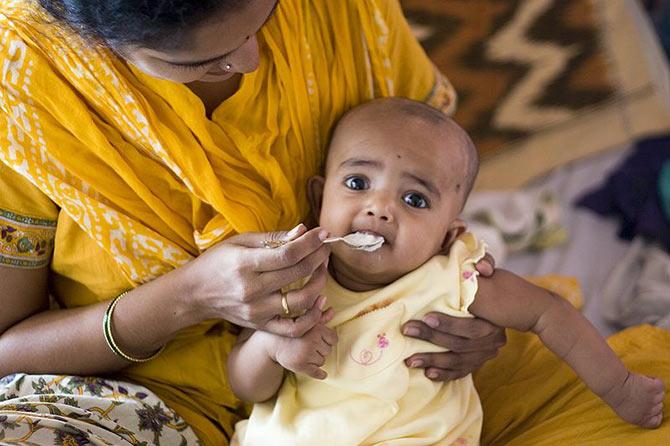Diarrhoea leads to loss of water and electrolytes from the body, often causing dehydration in children.
It is extremely crucial to keep your little one hydrated at all times, as an extended span of dehydration can lead to fatal outcomes, advises pediatrician Dr Satish Deopujari.

Diarrhea may seem like just another common monsoon disease.
But it is one of the top causes of mortality among children across the world.
According to the World Health Organisation, it is the second leading cause of death in children aged below five years of age.
Diarrhoea can jeopardise any child's health, causing discomfort, dehydration and listlessness.
It is a common condition affecting children that is caused due to loss of excess amount of water and electrolytes in stool, primarily due to infection.
Apart from stomach bugs, this ailment can be triggered in your child’s system due to several other reasons such as food allergies, lactose intolerance, and the effect of certain medications, among others.
There are two types of diarrhoea that a child can experience -- acute and chronic.
The former lasts for a few days or a week, whereas the latter is less common and troubles the child for over 2-4 weeks.
Typically, when it comes to children, diarrhoea can be self-limiting and treated at home and without the need for heavy medication.
If you are a parent who is perturbed with your child's watery stool, here are some things you can do to keep your child safe and healthy:
1. Watch your diet
Eating habits are very crucial during the formative years of your child's life.
During the first six months, it is advised to breastfeed your new-born as it keeps the risks of diarrhoea to a minimum.
Parents should be extra cautious about the nutritional value of the food items they are giving their toddlers.
There is no alternative to well-cooked and clean meals. Besides, a balanced diet holds paramount importance when it comes to the development of immunity and overall growth of the child.
If your child is already suffering from diarrhoea then stick to small portions spread across frequent intervals; instead, of coaxed feeding of large meals.
2. Ensure good hygiene
Diarrhoea is easily transmitted through contaminated sources. For instance, if careful disposal of children's faeces is not done, then one is prone to such diseases as their stool contains a greater pathogen presence as compared to adults.
By regularly following safe sanitation and maintaining good hygiene, such as washing hands frequently, parents can curb the chances of several infections.
These are some tips that will help you take good care of your child when he/she falls sick.
However, if the symptoms do not improve, one should immediately seek medical help/care.
3. Be wary of the ORS you opt for
Diarrhoea leads to loss of water and electrolytes from the body, often causing dehydration in children.
It is extremely crucial to keep your little one hydrated at all times, as an extended span of dehydration can lead to fatal outcomes.
ORS or Oral Rehydration Solution approved by WHO is the best option available in the market to restore the lost electrolytes in your child's system.
Usually, a solution of 500ml/day is advised for those less than 2 years of age, 1000 ml/day for children between 2 to 10 years, and 2,000 ml/day for kids older than 10 years.
While providing ORS, parents should be mindful of the fact that one entire packet is mixed at one time, and any unused solution that is left beyond 24 hours of mixing, needs to be disposed of.
4. Avoid alternative drinks
The market is flooded with options that claim to rehydrate, but in reality, are so rich in their sugar content that they end up doing more harm than good, for example ORSL and QRS.
Solutions that do not have an approval on their formulation by WHO may not be ideal to treat dehydration and can be fatal for the child.
Further, due to high glucose levels in these solutions, one might witness osmotic diarrhoea, a worsened condition leading to an increased loss of fluids and electrolytes.
Parents should also steer clear of packaged and bottled variants of fruit juices and health drinks.
5. Do not self medicate
An array of drugs are sold for the treatment of ailments such as acute diarrhoea or vomiting.
However, one must not self-medicate when diarrhoea persists.
Also, using pills from your first-aid kit to treat the problem among children is a big No!
Sometimes the wrong pill can lead to serious consequences like allergies. Hence, it is strongly advised to consult with your doctor if your child is suffering from diarrhoea.
Dr Satish Deopujari is director, Shree Child Clinics, Dhantoli, Nagpur and Professor Emeritus, Indira Gandhi Government Medical College, Nagpur.











 © 2025
© 2025